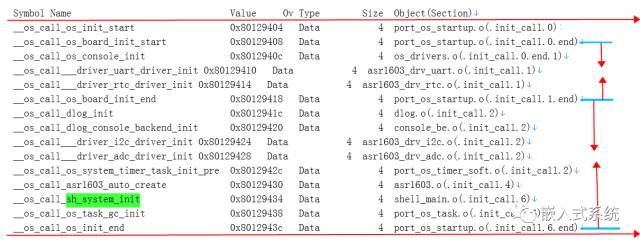<摘要> 展示section关键字的作用,以及在SDK实现开机自启动的应用
section主要作用是将函数或者变量放在指定段中,这样就可在指定的位置取出。
//section demo with gcc
#include "stdio.h"
int __attribute__((section("my_fun"))) test1(int a,int b)
{
return (a+b);
}
int test(int b)
{
return 2*b;
}
int __attribute__((section("my_fun"))) test0(int a,int b)
{
return (a*b);
}
int __attribute__((section("my_val"))) chengi;
int __attribute__((section("my_val"))) chengj;
int main(void)
{
int sum,c,j;
chengi=1,chengj=2;
sum=test1(chengi,chengj);
c=test(100);
j=test0(chengi,chengj);
printf("sum=%d,c=%d,j=%d\r\n",sum,c,j);
return 0;
}
编译生成map文件:
gcc -o main.exe main.c -Wl,-Map,my_test.map
my_test.map 文件片段如下:
.text 0x00401460 0xa0 C:\\Users\\think\\ccmGLaeH.o
0x00401460 test
0x0040146a main
.text 0x00401500 0x0 c:/mingw/bin/../libmingw32.a(CRTglob.o)
......
my_fun 0x00404000 0x200
[!provide] PROVIDE (___start_my_fun, .)
my_fun 0x00404000 0x1c C:\\Users\\think\\ccmGLaeH.o
0x00404000 test1
0x0040400d test0
[!provide] PROVIDE (___stop_my_fun, .)
.data 0x00405000 0x200
0x00405000 \__data_start_\_ = .
......
\*(.data_cygwin_nocopy)
my_val 0x00406000 0x200
[!provide] PROVIDE (___start_my_val, .)
my_val 0x00406000 0x8 C:\\Users\\think\\ccdMcTrl.o
0x00406000 chengi
0x00406004 chengj
[!provide] PROVIDE (___stop_my_val, .)
.rdata 0x00407000 0x400
分析可见,使用section修饰的函数和变量在自定义的片段,而且是连续存放在___start_xx到___stop_xx之间,这样可根据变量的地址得出与其同段变量的地址,为后续自动初始化等功能提供了基础。
基于前面section的作用,可以将同类函数指针全部使用同一个段名修饰,然后开机后系统自动检索段内函数指针,逐个执行,对上层应用就是无需主动调用,系统自动初始化。
考虑到硬件初始化与应用功能初始化的先后顺序,可以对段名进行分配,map文件按段名排序。自动初始化主体是OS_INIT_EXPORT宏。
范例代码出自中国移动的oneos开源版本,使用gcc,方案和国产RT-Thread类似。
typedef os_err_t (*os_init_fn_t)(void);
#define OS_INIT_EXPORT(fn, level) \
const os_init_fn_t __os_call_##fn OS_SECTION(".init_call."level) = fn
#define OS_BOARD_INIT(fn) OS_INIT_EXPORT(fn, "1")
#define OS_PREV_INIT(fn) OS_INIT_EXPORT(fn, "2")
#define OS_DEVICE_INIT(fn) OS_INIT_EXPORT(fn, "3")
#define OS_CMPOENT_INIT(fn) OS_INIT_EXPORT(fn, "4")
#define OS_ENV_INIT(fn) OS_INIT_EXPORT(fn, "5")
#define OS_APP_INIT(fn) OS_INIT_EXPORT(fn, "6")
例如shell初始化函数,定义如下:
OS_APP_INIT(sh_system_init);
将宏定义展开
/* 含义是函数指针 __os_call_sh_system_init
* 其指向sh_system_init函数,且该指针编译后放在".init_call.6"段
*/
const os_init_fn_t __os_call_sh_system_init
__attribute__((section((".init_call.6")))) = sh_system_init
系统自身也有自定义函数,用来标记起止点函数
OS_INIT_EXPORT(os_init_start, "0");//段起点__start
OS_INIT_EXPORT(os_board_init_start, "0.end");
OS_INIT_EXPORT(os_board_init_end, "1.end");
OS_INIT_EXPORT(os_init_end, "6.end");//段终点__stop
最终生成的map文件如下图:
//系统底层在合适的时机调用如下两函数,将指定段区间内的所有函数自动执行
void os_board_auto_init(void)
{
const os_init_fn_t *fn_ptr_board_init_start;
const os_init_fn_t *fn_ptr_board_init_end;
const os_init_fn_t *fn_ptr;
fn_ptr_board_init_start = &__os_call_os_board_init_start + 1;
fn_ptr_board_init_end = &__os_call_os_board_init_end - 1;
//将段首尾区间内的函数全部遍历执行
for (fn_ptr = fn_ptr_board_init_start; fn_ptr <= fn_ptr_board_init_end; fn_ptr++)
{
(void)(*fn_ptr)();
}
return;
}
static void os_other_auto_init(void)
{
const os_init_fn_t *fn_ptr_other_init_start;
const os_init_fn_t *fn_ptr_other_init_end;
const os_init_fn_t *fn_ptr;
fn_ptr_other_init_start = &__os_call_os_board_init_end + 1;
fn_ptr_other_init_end = &__os_call_os_init_end - 1;
for (fn_ptr = fn_ptr_other_init_start; fn_ptr <= fn_ptr_other_init_end; fn_ptr++)
{
(void)(*fn_ptr)();
}
return;
}
系统执行os_other_auto_init时实现了sh_system_init的自动执行,即使应用层没有显示的去调用它。使用符号段的方式实现初始化函数自动执行,应用层修改软件,增加功能启动或者裁剪,对底层代码无需任何改动。更多信息请关注微信公众号【嵌入式系统】。
注意:段中函数类型都是一样的,范例是同一类函数指针,也可以是结构体,需要确保每个成员占用空间大小相同,这样才能逐个遍历。
不同编译器对section属性的定义略有差异,但效果相同。
/* Compiler Related Definitions */
#if defined(__CC_ARM) || defined(__CLANG_ARM) /* ARM Compiler */
#define SECTION(x) __attribute__((section(x)))
#elif defined (__IAR_SYSTEMS_ICC__) /* for IAR Compiler */
#define SECTION(x) @ x
#elif defined (__GNUC__) /* GNU GCC Compiler */
#define SECTION(x) __attribute__((section(x)))
#elif defined (__ADSPBLACKFIN__) /* for VisualDSP++ Compiler */
#define SECTION(x) __attribute__((section(x)))
#elif defined (_MSC_VER)
#define SECTION(x)
#elif defined (__TI_COMPILER_VERSION__)
/*
* The way that TI compiler set section is different from other(at least
* GCC and MDK) compilers. See ARM Optimizing C/C++ Compiler 5.9.3 for more
* details.
*/
#define SECTION(x)
#else
#error not supported tool chain
#endif
上面的 #error 也是个应用技巧,配搭 #if / #else / #endif 在编译阶段即可发现代码问题,一般用于判断宏定义的配置是否在预期之外,编译报错必须修改。
配合C关键字,对代码的安全校验、扩展移植都会有很好的效果,可参考前文 C语言关键字技巧。对小型项目、个人独立开发看不出效果,但对复杂的多人合作的项目,合适的关键字对代码的稳定性和架构是锦上添花。
end
一口Linux
关注,回复【1024】海量Linux资料赠送
精彩文章合集
文章推荐